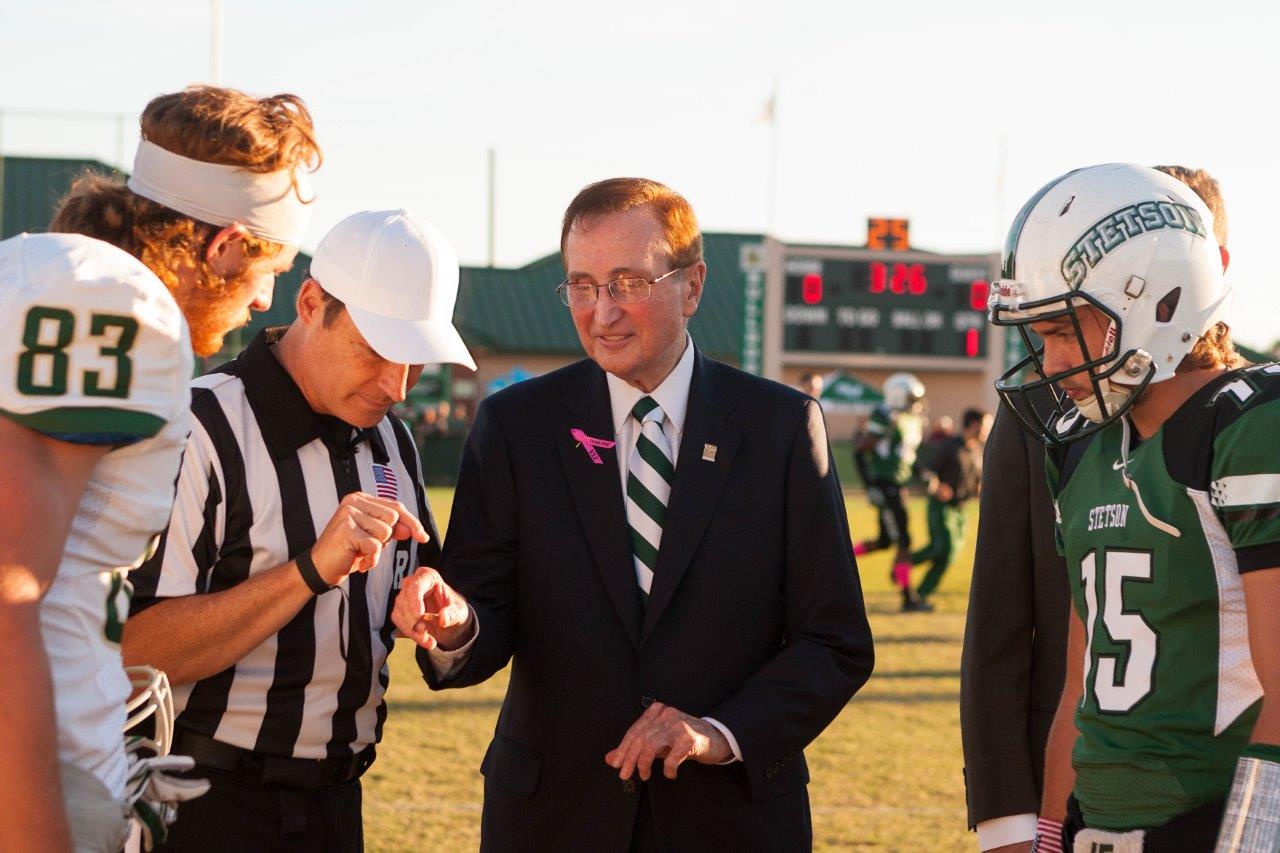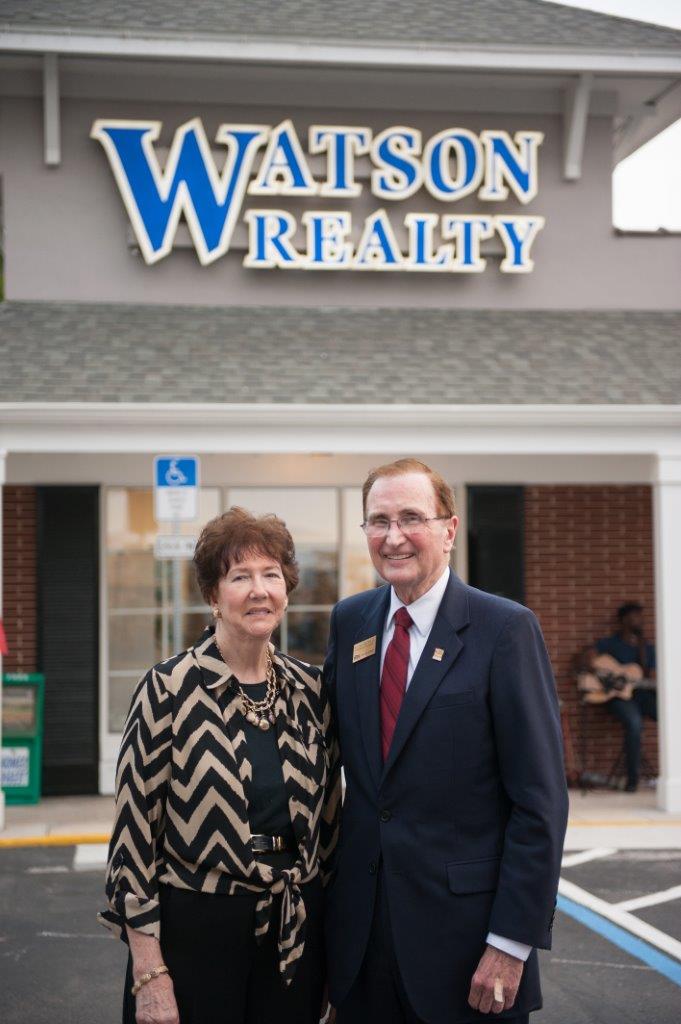Features
Bill Watson (Stetson) can trace his interest in real estate back to one of his business professors who had a special skill for getting students excited about real estate. “He created so much excitement about real estate opportunities to the class and painted the image that we’re not training you to be real estate salespeople, we’re training you to be leaders and entrepreneurs, to control your destiny. He asked us, Where is the wealth in the US? Who is in a better position to understand what a good value is?”
This prescient mindset by one of Bill’s professors would prove to be the spark that launched his career in real estate. Now, over 50 years later, Bill’s personal portfolio of individually-owned and Watson Realty Corp. properties includes 240 single-family homes, 68 office buildings or commercial properties, three apartment buildings and other miscellaneous properties. The company he founded, Watson Realty Corp., operates 43 real estate offices, 29 property management offices, two title companies, a mortgage company, and a maintenance division which includes plumbing, electrical, heating and air and home improvement, as well as a School of Real Estate, a Commercial Division, and a limited-function referral division with over 600 members.
Bill credits his company’s success to the leadership skills he developed in Sigma Nu’s Delta Mu Chapter at Stetson. “You have to concentrate on the basic skills, and invest heavily in your people. That relates directly to the fraternity. We’ve built our company on a military concept. I always tried to do a good job promoting, and softening up the market. Just like the military, you don’t take the market until your people take the market.”
Sigma Nu as the formative Years
Bill remembers a culture in the chapter that expected brothers to perform well academically. “There was a degree of responsibility for those around you. We were all expected to look out for our Sigma Nu brothers,” he remembers.
There’s one example in particular Bill recalls that illustrates the chapter’s support for strong academics. He was taking Saturday classes at the time and the Sigma Nus were planning their big hay ride event. Bill was dating his future wife at the time and told her he’d have to skip the event to prepare for his test the next day – a discipline not found in typical college students.

Bill prepares to toss the coin at a Stetson vs. Jacksonville football game.
Bill has always maintained a fondness for the railroads dating back to when his father and grandfather worked as train conductors. “We only had one car growing up, so we would always be driving to Union Station if he was running passenger trains or the shipping yard if he was running freight.” Bill’s grandfather worked for Southern Railroad and his father worked for Seaboard Coastline Railroad, now CSX. As he entered high school, he loved making money and saving to buy a car, but he realized the importance of getting a good education. “That was one of the things I liked about the Sigma Nus when I first arrived on campus. I could tell they were concerned about new members excelling in the classroom.”
“I worked summers and almost a full year before entering college. But the Sigma Nus wanted you to make good grades. We had study hall to instill that discipline. If you ever needed help with classwork, you could always count on a brother to provide guidance.”
In addition to a focus on academics, Bill was attracted to the Delta Mu Chapter because they were clearly the top performers on campus. “For those four years, we were superior to the other fraternities,” he remembers. “We were so dominating in leadership and activities that the school implemented a quota system in an attempt to level the playing field. The new limit was 65 members – we had 90.”
When Bill was attending Stetson, the students were expected to attend chapel once a week on Tuesday or Wednesday. The old Sigma Nu house was two blocks from the chapel in Elizabeth Hall.
Coffee and donuts would start at eleven in the morning at the fraternity house and Bill remembers, “All the ladies would stop by. We had all the hit records playing. It was a great way to interact socially.”
Bill has fond memories of the fraternity brothers serenading the ladies on campus when they were “pinned,” a tradition that has faded since his time. “They don’t do that anymore,” he says. “We would march three abreast and sing. This was before air conditioning. The ladies would be watching from the windows. We would present the white roses. It was impressive. It was a significant occasion and the ladies on campus loved it.”

Bill Watson with his wife, Janelle, at the opening of Watson Realty Corp.’s new office in Mount Dora, Fla.
When Bill was matriculating at Stetson the Delta Mu Chapter was an example of the way success breeds success. “Quality brothers bring more quality. We have adopted this same mindset with our business. If you don’t recruit quality Sigma Nus, you lose that benefit. That works the same way in business. You’re known for the company you keep.” Bill also remembers being impressed by the military inspired organizational structure and what he calls the aura of the Commander. “That’s different from a president. The commander is the leader. I liked the concept for the military connection. I liked the formality and the three cardinal principles,” he recalls.
“I was impressed with the goal-setting and the emphasis on working as a team. It showed in the presence our brothers had within ROTC. We graduated a lot of great officers.” Many of these ROTC leaders Bill references would go on to serve distinguished military careers, including two Lt. Generals, Jim Crysel and Jack Woodall, who were featured speakers at the 2013 College of Chapters.
Lifelong Commitment
As someone who has witnessed the power of brotherhood, Bill has always encouraged students under his wing to join the fraternity community. “If you go to college and don’t join a fraternity, when you leave college you’ll be missing out on a big network of support.”
“The Greeks are the ones who contribute to the university,” he observed. “Non-Greeks don’t have the same affinity for the college.” For Bill, this isn’t just an empty statement – he’s demonstrated a lifelong commitment to Stetson and the Delta Mu Chapter.
Delta Mu Chapter recently celebrated 100 years at Stetson and Bill was there to join the anniversary event. “It was really exciting and gratifying to celebrate that milestone. It was a thrill. 100 years doesn’t happen very often – maintaining that level of longevity separates you from the competition.”
When he thinks back about the most important leadership lessons he learned in Sigma Nu, the first thing he mentions is the importance of focusing on the bigger picture. “You have to look at the big goal. Don’t get wrapped around the axle on the minor things.”
Managing different personalities is always a challenge for entrepreneurs and business owners as it is for student leaders. Bill has carefully managed his professional relationships, with a broader emphasis on always treating people the way he would want to be treated. “We don’t want anyone to leave as an enemy. We want them to leave as a friend. You win by lifting them up and maximizing their talents.”
When Bill encounters an employee who isn’t a good fit, he’s always handled personnel changes diplomatically. “You are not doing someone a favor if they are failing and you keep them in your business,” he says. “We try to handle career changes in a very positive way: We think a lot of you and you have many good skills and qualities but it’s not a good fit for our organization. We’re not going in the same direction. But we like you and wish you the best.”
Helping new employees learn the company culture is also a critical skill for any business leader. When hiring, Bill says he looks for people who do things unsuccessful people don’t do. Anytime Bill is losing focus, he likes to recall the famous Vince Lombardi quote, “Mental fatigue makes cowards of us.” This inspires him with the discipline to do a little more. “Successful people are committed and they reap the benefits of success. Success is a lot of fun – failure is not much fun.”
“We try to inspire new employees. They owe it to themselves. You must have the discipline to make that additional call, to do one more visit. This divides the winners from the losers.”
Bill is quick to see the parallels between sound hiring practices and fraternity recruitment. “Look for people with good personal skills,” he says. “Look for people with a strong sense of commitment, not only in their work but also in their ethics. If they’re only focused on the fun part then they’ll take you in the wrong direction.” Bill has witnessed this problem in college freshmen who arrive on campus and don’t focus on academics. “They don’t realize that they are at a critical focal point in their life – they don’t realize that if they don’t graduate the trajectory of their entire career will be affected.”
Bill has had many years to observe the qualities that make for a model employee, and he can list them off from memory. “Dress like you care about your job. Don’t overreact before you know all the facts. It’s very important to hold your mouth – there’s nothing to be gained from criticizing people.”
“We see ethical leadership as self-discipline, as a commitment to do the right thing and not be swayed by the pain or price it costs to stick to your principles.”
“We have built our organization on the basics,” he says. “Be positive, outwork your competition, and focus on ethics and quality. We will not allow ourselves to be corrupted by one little thing. Our word is worth more than that.”
There’s also a firm commitment to developing employees that runs through the company culture. “We strive to take the individual’s strengths and multiply and accelerate them,” Bill says of mentoring employees. “We have found you are not successful in changing negatives – so focus on the positives.”
“We see ethical leadership as self-discipline, as a commitment to do the right thing and not be swayed by the pain or price it costs to stick to your principles. Doing the right thing wins out in the long run. We won’t compromise our principles. There are certain things where you draw the line. Do things the right way and you’ll be a longer-term winner.”
When it comes to business acumen and ethical leadership, Bill sees the fraternity experience as an indispensable asset for young men. “These are young guys right out of high school with limited experience. You’re running these chapters with young men and we’re molding them to perform like senior business leaders.”
So why has Bill chosen to stay involved all these years? “I have a high degree of loyalty and commitment. If you give me an assignment, I’m going to give 110% or not take it at all. Sigma Nu means a lot to me. Those were the formative years. I could have gone another direction and not achieved the same success. It really made a difference in my life, and I am thankful for the opportunity to be a Sigma Nu.”